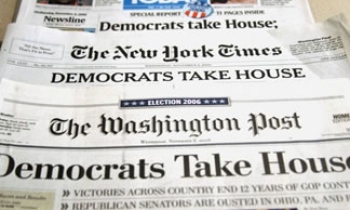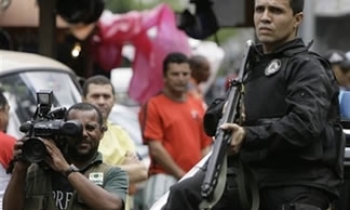The United States, Britain, and the Netherlands have all assailed the deal made with the Taliban by Italy and Afghanistan to secure the release of Italian journalist Daniele Mastrogiacomo, according to news agencies.

The United States complained to Italy over the exchange of several members of the Taliban in exchange for Mastrogiacomo, who was freed Monday in southern Afghanistan, an Agence France-Presse (AFP) report said quoting a US official in Washington.
The United States, Britain, and the Netherlands — who have troops fighting the Taliban —said that handing over Taliban militants sent the wrong message to hostage-takers.
“The UK has serious concerns about the implications of releasing Taliban in return for hostages,” a spokeswoman for Britain’s Foreign Office said. “This sends the wrong signal to prospective hostage-takers.”
In Washington, a US official speaking on condition of anonymity, said that the swap increased the risk of similar kidnappings of NATO and Afghan troops, according to AFP.
“Although we are pleased with the release of the Italian journalist, we do have some concerns about the circumstances surrounding his release,” the official said. “It is US policy to use every appropriate resource to gain the safe return of hostages, but to make no concessions to individuals of groups holding those hostages,” she said, adding that the United States “did not and do not approve of concessions to terrorists.”
“We believe that these concessions increase the risk to NATO and to Afghan troops and to the Afghan people,” the official added, saying that Washington had “communicated those concerns” to Italy through diplomatic channels.

Dutch foreign minister Maxime Verhagen, on a visit to Kabul Wednesday, said that governments should not give in to hostage-takers.
“When we create a situation where you can buy the freedom of Taliban fighters when you catch a journalist, then in the short term there will be no journalists anymore,” he said. “The Dutch government will not give in to such a situation because otherwise you will support the taking of hostages and we don’t want it,” he told reporters at a media briefing at the end of a three-day visit.
The Afghan president’s office has admitted that some Taliban prisoners were freed to gain Mastrogiacomo’s freedom, without stating how many. A spokesman for Afghan President Hamid Karzai has said the Afghan government made the deal only “in recognition of the friendship with Italy”.
Italy, which has 1,900 troops under NATO command in Afghanistan, confirmed on Wednesday that five Taliban militants had been released and said this was in exchange for the freeing on Monday of reporter Daniele Mastrogiacomo, held for two weeks by the Taliban. A Taliban commander confirmed to Pajhwok Afghan News that five Taliban prisoners had been released in the deal.
Mastrogiacomo was abducted from the southern province of Helmand March 4 with a translator and a driver. The journalist said that his driver was beheaded in front of him.

The exchange may have a lasting negative effect on reporters’ willingness to take risks, and the Taliban might turn to kidnapping government officials for ransom, said Mohammad Qassim Akhgar, a political analyst who works on human rights issues in Afghanistan, an Associated Press (AP) report said.
Akhgar said he doubts it was the first time concessions have been made to free a hostage in Afghanistan, but that the terms agreed to this time were more significant. “Maybe the enemy will realize the great benefit they gained from this deal, and tomorrow even the reporters in Kabul won’t be safe,” Akhgar said. “This is not good. The government can’t let the enemy use this strategy.”
Britain has 6,300 troops in Afghanistan as part of the International Security Assistance Force (ISAF), most of whom are in Helmand province, with 1,400 more due to join them.
In Rome, press reports said that the Italian defence ministry also had concerns over the deal with the Taliban.
While Prime Minister Romano Prodi thanked humanitarian agency Emergency for its efforts in obtaining Mastrogiacomo’s release, defence minister Arturo Parisi was angry, according to the daily Corriere della Sera.
Parisi said that “entrusting the negotiations to [Emergency founder] Gino Strada was a serious mistake,” Corriere reported citing an unnamed source close to the minister. Corriere said that Parisi felt “the political price that we have already paid could be much higher in the future” in Afghanistan, where Italy has some 2,000 troops deployed in ISAF.

The economic daily Il Sole-24 Ore said the minister feared that the prisoner exchange may have set “a dangerous precedent.”
The international backlash is the latest headache for Prodi, who has fought hard to keep troops in Afghanistan despite resistance from pacifists within his centre-left coalition, Reuters said. He even briefly resigned last month after a defeat in the Senate over his foreign policy, including Afghanistan, and needs the Senate next week to approve a refinancing of the mission.
An opinion poll published by Mastrogiacomo’s newspaper, La Repubblica, showed that 51 per cent of Italians surveyed supported the exchange, while 41 per cent opposed it.









